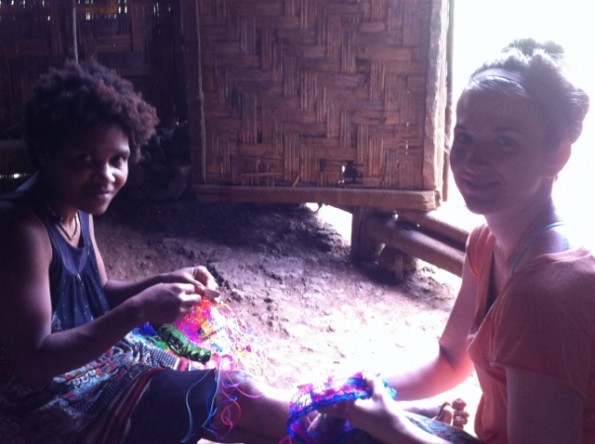During September we’re focusing on learning to disciple. Please see the Monthly Prayer Focus page to read our strategic prayer request for this month.
By Erin Duplechin
As I sat with the young Papua New Guinean mom at my kitchen table and read the short Tok Pisin devotional, I felt nervous inside. I wondered if she really wanted to be here, if what I was reading was relevant to her, and if this is how discipleship works best in PNG. She listened attentively, but offered very little feedback. I fumbled over explanations and reasons and wondered if my Tok Pisin was clear or incorrect and, if incorrect, if she would tell me. Finally she said, “It’s good for us to think about God.”
I felt some relief in her words, but still wondered if the devotional really touched her heart or not. I still don’t know; Papua New Guinean culture doesn’t allow for as much feedback as our Western culture does.
I’m often asking myself how we can do discipleship better here in PNG.
I have had many disciplers, or spiritual leaders, throughout my life. Pastors, teachers, professors, mentors here and there, and two significant women whom I would call spiritual mothers. I have never been without spiritual leadership or guidance in my life. If I wanted it, there was almost always someone I could call or write to, that would respond and pray for me.
This is not the case for Papua New Guineans. If a community is fortunate enough to have a pastor, the pastor’s training is usually minimal, if he has any at all. Most Papua New Guineans, even leaders, have not experienced good discipleship. They have few resources and a lack of people willing and able to train them.
So, what is discipleship really? There are a lot of good definitions out there. People have written entire books about it. Some have dedicated hours of study and research in attempts to have a better understanding of discipleship. The Western world has it figured out.
But in a situation such as it is in PNG, where people have little education, resources, and where literacy is an issue, we have to reevaluate what discipleship looks like. We have to get back to the basics. And we have to pray. A lot.
I find myself drawn to the Gospels and the example of Jesus with His twelve. They had decided to follow Jesus, to learn from Him, and do what He said. However, their discipleship wasn’t just about a teacher/student relationship, though that was a significant part of it. It was bigger than that. It was also about friendship and walking alongside one another. I can imagine days where they were hanging out, just thirteen Jewish guys, laughing over some inside joke.
Jesus invited the twelve into His world. They were with Jesus through highs and lows. Some were with Him on the mountain top, eleven were with Him in the garden. They got to be part of what God was doing in the space around them. They partnered with Him in His ministry. They were invited into the bigger story.
So, how can we invite Papua New Guineans into the bigger story in a way that is culturally appropriate and effective? We’re still learning how to do this.
We can start by building relationships, offering our friendship and an invitation to know Jesus more fully. We can sit with them under mango trees and in their bush houses; we can share tea and biscuits with them at our tables. We can tell them God’s story and teach them how to, in turn, share that story with others.
Most importantly though, we have to pray and ask God for wisdom and guidance. We must ask Him the most effective way to disciple Papua New Guineans. The best way may not be the fastest or the easiest and it may look different than what we have experienced in our passport countries. But the end result of transformed lives will be worth it.
Erin is serving in PNG with her husband, Kevin, and their two girls.